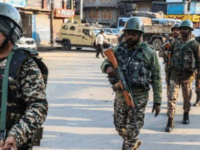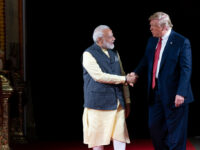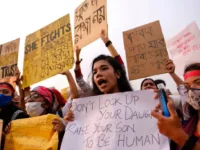Millions down tools in ‘Bharat Bandh’: a new resounding rebuke to Modi government’s pro-corporate agenda

On Wednesday, over 25 crore (250 million) workers from across India — spanning key sectors such as banking, insurance, postal services, steel, power, coal mining, transport, ports, construction — took part in the Bharat Bandh, a nationwide 24 hour-general strike. The streets in many cities and rural districts alike were filled with workers and farmers demanding a decisive break from policies that have increasingly stripped them of their most basic rights.
While the strike was unevenly observed, in some states like Kerala and Assam it took the form of a near-total shutdown. In Kerala, even autorickshaws and taxis stayed off the road, and the majority of hotels and restaurants remained closed.
In a number of places, trains and buses were stopped in their tracks, highways blockaded, and workplaces picketed. Workers in most industrial areas in the country came out in force. Of particular significance is the widespread participation in the strike in the northeastern state of Manipur —showing that even in a region fractured by ethnic violence and repression, oppressed communities and workers can organize and fight on common ground.
This strike, called jointly by ten major trade unions as well as farmers’ and agricultural workers’ organisations, was an important show of unity between India’s urban and rural working classes. Their demands included the repeal of Modi government’s anti-worker labour codes, a halt to the casualisation of labour and to the aggressive privatisation of Public Sector Undertakings (PSUs) and other public services, and the institution of a national monthly minimum wage of ₹26,000. Workers also raised opposition to the Telangana government’s recent decision to introduce 10-hour workdays (replacing the standard eight-hour shift) and Karnataka’s recent amendment to extend the maximum formal working day from 10 hours to 12 hours in some sectors.
Farmers joined the call in large numbers, raising their own demands — the enactment of a guaranteed Minimum Support Price (MSP) for their crops, the cancellation of crippling agricultural loans, and an end to forced land acquisitions.
A missed opportunity
The action was originally scheduled for May 19, but was postponed following the escalation of military tensions between the Indian and Pakistani states. In our view, that earlier decision was a mistake.
By postponing the strike, the trade union leadership effectively ceded ground to the very nationalist jingoism that the strike could and should have directly challenged. War crises are routinely used by the ruling classes to distract from domestic crises, suppress dissent, rally public opinion behind them and divert anger toward “the enemy across the border.” The unions had a rare opportunity to break through that fog of war with a mass action grounded in class unity and the real grievances of ordinary people. The strike could have then also raised slogans against war, terror, militarism, and against the communal polarisation fanned by Modi’s regime, uniting workers from all faiths against it.
The delay also partially dampened the momentum that had been building on the ground. Many workers and activists were already mobilising and preparing for May 19. The sudden postponement not only caused confusion but also sent a message that their vital economic and social demands needed to take a backseat to the dominant war-mongering agenda of the government.
Nonetheless, the July 9 Bharat Bandh showed the depth of frustration bubbling beneath the surface. The mass participation in the strike stands as a rebuke to the recent and much-publicised World Bank report bizarrely ranking India as the fourth most equal country in the world. On the ground, reality could not be further from this fantasy. Skyrocketing prices, job insecurity, mass youth unemployment, rural distress and widespread informalisation of labour have squeezed workers, farmers and their families to the brink. The strike’s turnout was a loud rejection of the myth that the Indian economy is booming for all — when in fact, it is structured to benefit a handful of corporates and cronies, at the expense of the vast majority.
Where is the plan to win?
Yet this was not a one-off event. Wednesday’s Bharat Bandh marked the fourth major general strike in India since 2020, and the 23rd since 1991. Each time, tens of millions answered the call, but despite these spectacular mobilisations, little has changed, and the relentless assault on people’s livelihoods has continued unabated. Why?
The elephant in the room is the crisis at the heart of the trade union movement; many of its leaderships are affiliated with opposition parties that have a record of embracing pro-corporate policies themselves, and treat these strikes as symbolic pressure tactics —not stepping stones toward a sustained and escalating movement. Although the ‘INDIA’ opposition bloc claims to oppose the BJP-led policies at the Centre, several of its constituent parties revealed their true colour on strike day —most notably in West Bengal, where the TMC-led state government unleashed one of the heaviest police crackdowns on protesters, despite Chief Minister Mamata Banerjee rhetorically extending her support to the bandh. In DMK-ruled Tamil Nadu, too, many worker activists were detained.
Each general strike draws in millions, but is then followed by a long silence. There is no national plan to build rank-and-file strength, no serious effort to link up workplace struggle with community resistance and with wider battles against caste oppression, gender violence, communalism, war, ecological destruction or the erosion of democratic rights. Most crucially, no credible, working class political alternative is being forged that can actually challenge the policies of the ruling class, and capitalism itself. Without that, even the most powerful strikes risk becoming ritualistic — a release valve, rather than a real lever for change.
Still, the determination and energy shown by workers and farmers in this Bharat Bandh proves that the potential for a deeper, more militant resistance exists, and that the Modi government and the capitalist class it serves are vulnerable. What is missing is not resolve from below, but a leadership that is willing to match and harness it —one that arms itself with a longterm fighting strategy, confronts pro-corporate state governments without hesitation, and takes bold steps toward building the independent political force that the working class and the oppressed in India so desperately need.





